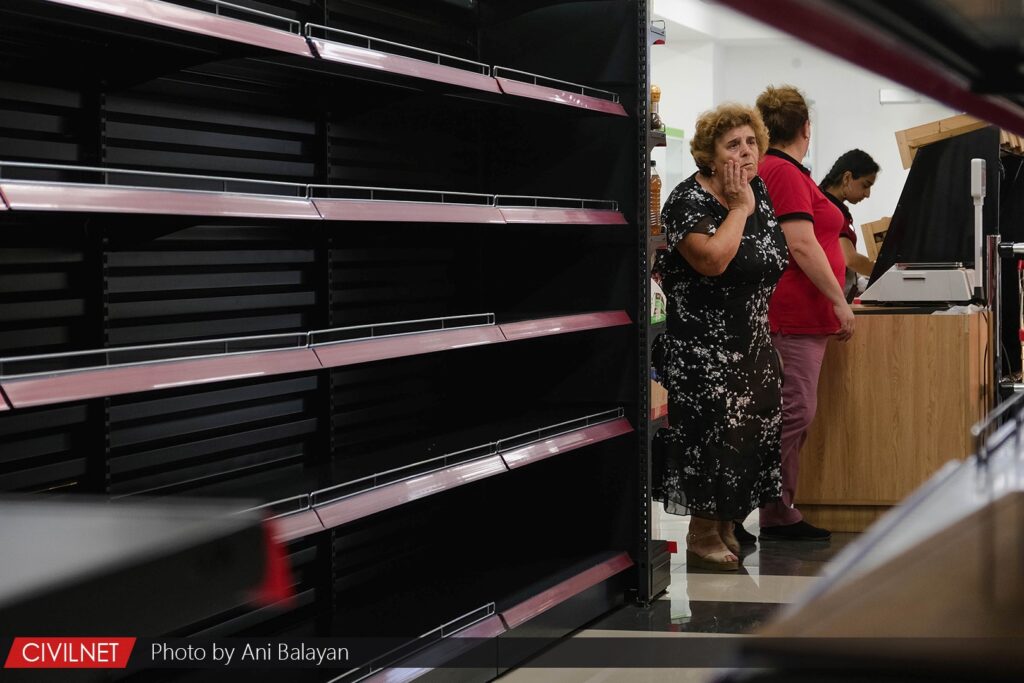The authorities in Nagorno-Karabakh have reported that a 40-year-old man has starved to death in the eighth month of the region’s blockade by Azerbaijan.
In a statement on Tuesday evening, the Human Rights Defender’s Office said that K Hovhannisyan had died of ‘chronic malnutrition’ and ‘protein and energy deficiency’. The statement was accompanied by a photo of an emaciated body [warning: link contains graphic imagery] purportedly that of Hovhannisyan.
The Human Rights Defender’s Office laid the blame for Hovhannisyan’s death squarely on Azerbaijan, calling it one of the ‘catastrophic consequences of the ongoing 8-month-long blockade of Artsakh [Nagonro-Karabakh] by Azerbaijan’.
The statement added that the impact of the blockade on the public health sector ‘primarily affects the health situation of the most vulnerable groups of the society — children, pregnant women, people with chronic diseases, people with disabilities, and older persons’.
Nagorno-Karabakh’s population of around 120,000 people have not been able to leave or enter the region since mid-December, when Azerbaijani government-backed protesters, later replaced by a border checkpoint, blocked the Lachin Corridor, the only road connecting Nagorno-Karabakh to Armenia. Supplies to the region have also been intermittently blocked, with the humanitarian aid previously delivered by the Red Cross and Russian peacekeeping forces halted since mid-June, leading to acute shortages of food and medicine.
The absence of fuel and electricity supplies from Armenia has also led to rolling blackouts and the suspension of public transport, cutting settlements off from each other.
While residents in rural areas have in part used agricultural lands to meet their needs, supermarkets in the capital Stepanakert have remained bare, with supplies from villages unable to reach the city due to the lack of fuel.
The suspension of waste collection due to the fuel shortage has also raised concerns of a possible epidemic in Stepanakert, as waste piles up in the summer heat.
Azerbaijan denies blocking the Lachin Corridor and also insists that supplies could be delivered from Azerbaijani-held Aghdam, a proposal dismissed as untenable by Stepanakert and Yerevan.
A number of Western countries and international organisations have called on Azerbaijan to lift the blockade and restore free passage of people and goods, one of the stipulations of the 2020 ceasefire agreement.
Following Hovhannisyan’s death on Tuesday, Armenia’s Ambassador-at-large, Edmon Marukyan, called on the international community to ‘take action’ to prevent the ‘ethnic cleansing’ of Nagorno-Karabakh’s Armenian population.
‘We were warning about this on a daily basis for already 8 months’, Marukyan wrote.
The UN Security Council is due to hold an urgent meeting on Wednesday to discuss the situation.
For ease of reading, we choose not to use qualifiers such as ‘de facto’, ‘unrecognised’, or ‘partially recognised’ when discussing institutions or political positions within Abkhazia, Nagorno-Karabakh, and South Ossetia. This does not imply a position on their status.




 15 August 2023
15 August 2023



